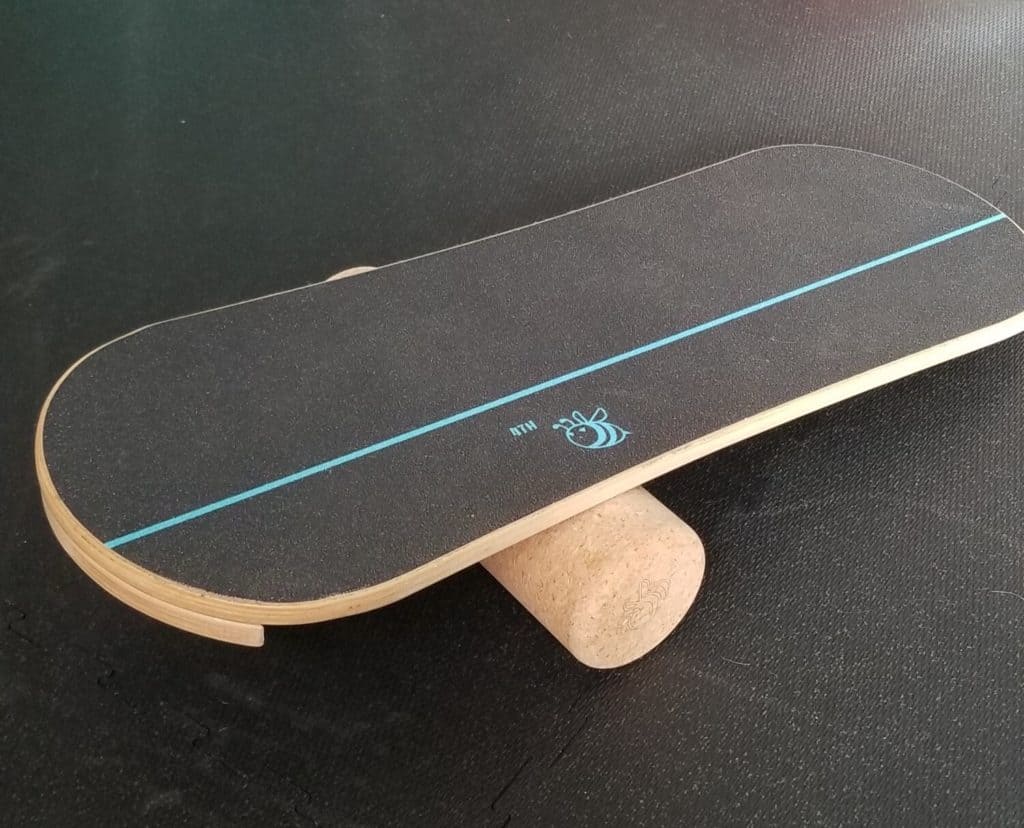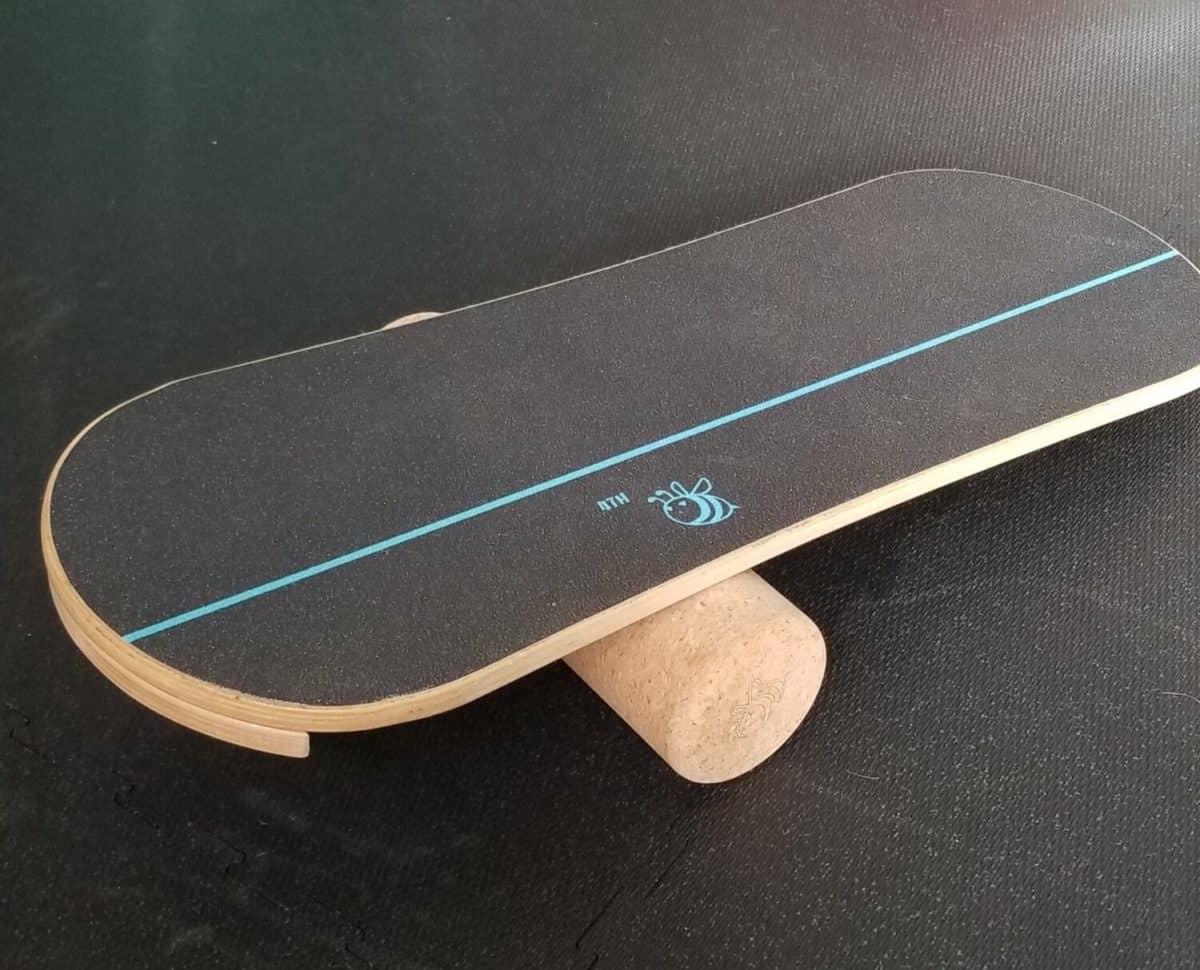I have never been good at any board sports be it on snow, water, wheels or any type of unpredictable surface. Basically all those things that adrenaline junkies love, skiing, skating, surfing, snowboarding are not my forte. I shimmy, freak out, tense up, and go careening out of control. Those last words are probably the reason that I don’t like any of these endeavors, no one really loves being out of control. Of course if you take the leap and attempt to increase your skill at these activities you can gain some control and learn a few things beyond learning the new skill.
EXPLORING A NEW SKILL
This year Santy Claus brought my kids a bongo board for Christmas. For those of you not familiar it looks like this…

Yes that would be a board teetering on a cylinder. My kids and husband jumped on and off balancing with ease. I barely put my weight on it and found myself nearly breaking my neck. I thought to myself, as a personal trainer I teach people for a living how to get the most out of their bodies and accomplish all sorts of physical tasks and feats, I should be able to teach myself how to balance on a piece of wood. So I sneered at the board and vowed that I would tackle this toy. I have never done a New Year’s resolution but it was that time of year, why not join the hordes, and resolved to do five minutes a day of exploring movement on a bongo board starting a little early on Christmas Day.
DAY 1: A very sturdy banister was involved, that was held with a fervent death grip as I cautiously stepped onto the board. I stepped one foot on the side resting on the ground and gently put my other foot on the opposite side and tipped it up from the ground so the board teetered on the cylinder. I attempted to lessen the death grip and keep the board balanced. I wasn’t trying any fancy trick, in fact my goal was no movement, just level the bloody board on the roller. I wanted to balance for ten seconds. Well, I did ten seconds, one second at a time. Balance, thunk, balance, grab banister, balance, curse loudly. My hands were stiff, breath held, my whole body was tense, and my nervous system must of thought my life was in danger because a cold sweat broke out due to simply trying to stand on a piece of wood. I was quickly finding out that lesson number one in this endeavor was humility.
I decided to regroup, access my strengths, and use my expertise to take apart this skill. So I first found some skilled practitioners and studied how they move on the bongo board. My skilled practitioners were my two boys who adeptly jumped on the board, wobbled a bit, and proceeded to expertly maneuver it. I noticed the ease of their stance, their highly active feet, and bouncy knees. I also reminded myself when I teach people a skill I have them do parts of the skill to gain familiarity which also enables them to find accomplishment in mini bits of successful moves. Interest is lost quickly if there is no hint of accomplishment. I tucked away these thoughts and reminders to myself to use on my next go.
TIPS ON SKILL ACQUISITION: When learning a new skill there are some key elements to keep in mind. If you consider how I described my first attempt on the board there was tension, lack of breath, heightened awareness, errors, and nerves. These are signs of a person in the initial stages(cognitive) of skill acquisition, otherwise known as motor learning of which researchers discuss at great length. If you wish to learn more you can check this article out. Simply put, the early stages of learning a skill is rather trying.
Here are some simple tips that can speed up this highly cognitive stage(which for myself ironically had gone out the door when I jumped on the board). First, focus on not holding your breath. Secondly, find where you are holding muscular tension, and try to relax those areas that are not required to accomplish the present task. We tend to tense our shoulders, hands, and jaws so check those areas and release any undue tension. Doing this saves energy enabling you to practice longer which will get you to your goal quicker. Lastly try to view your errors as a place to learn instead of a mistake. This can lessen frustration and keep you in a better mental state which is also more conducive to learning.
TAKE TWO: It’s day two and I took my own advice from above, focused on my breathing and tried to relax my upper body as I continued my journey on the bongo board. I first gave myself some easy drills. While I held on to the banister I decided to simply tip one side up off the ground ten times, and ten times on the other side. Yay! I succeeded in my tipping exercise. Then while still holding on I would just try to tip it back and forth ten times each side again. Phew, success again. Third I would give myself a goal of trying to balance without holding on for five seconds and nearly succeeded. My five minutes was quickly completed and I was done for the day.
SLEEP GIVES YOU SKILLS
Another important component that happened in between day one and two, was sleep. Sleep can create a performance improvement with no further practice, termed “offline learning”(1). During slow wave sleep our brain consolidates useful information saving it and cleaves off useless garbage giving us a more refined movement after the restful sleep. Offline learning can sometimes feel like a miraculous leap in your skill level overnight. Many musicians experience this in not being able to conquer a piece of music and the next morning they play the piece effortlessly. As if the young didn’t need more of a boost this effect is more accentuated in the youth and diminishes as we age. So sleep, it does a body good!
As the days went by I would do my drills, and slowly tried to balance more and more. By day three I was able to balance for ten seconds without holding on. I constantly reset myself trying to relax more and hover less with my hands over the banister, but balance was starting to be achieved with no touching. Yay me! I would also point out that I was doing this on a carpet which has more friction so the roller moves slower which is an advisable surface to start on. By week three I graduated to trying on a flat surface. Humility again, which can be witnessed below.
Graduated to a hard surface so back to holding on, skills come in baby steps. Was able to balance better than the first attempt on soft surface so still progress, yay!
BONGO BOARD HELPS BALANCE
This goal of practicing on a bongo board felt a bit silly and a useless skill to acquire considering I wasn’t going to take up a board sport anytime soon. Yet I later found out there has been some small preliminary research investigating these modalities that showed some balance improvement in the elderly(2, 3). In one study the board was on a air filled disc which is a more manageable and approachable device to start on, and creates multi-axis movement. They practiced for ten minutes three times a week. If they were able to practice daily they maybe would have had increased results. Loss of balance as we age leads to falls which is a huge burden on the healthcare system and for individuals who lose autonomy and mobility. This may have started as a silly skill to acquire but it will hopefully increase my reaction time, and balance ability, BONUS for me.
I have continued my adventure with the bongo board. On the soft surface I have moved away from the wall and can now continuously balance for the five minutes. I try to move back and forth and attempt to control my movement balancing on the edges. As you saw above on the slicker solid surface I returned to having a bar to hold onto but will hopefully be able to graduate from and balance easily again.
Finally off the training wheels of grabbing a banister and on the softer surface I can balance with a modicum of confidence.
FINAL THOUGHTS
In starting this I purposely chose a skill that I knew was out of my wheelhouse. I wanted to revisit that feeling of trying something that was going to be a challenge, even a bit fear inducing. You can have some interesting insights into yourself when you tackle a task that is particularly uncomfortable for you . In the past I have been hard on myself and got easily frustrated, but this time out I tried to treat myself as if I were a client trying to be patient, considerate, and congratulatory. I tried to find the small accomplishments with each practice even on days when there wasn’t a ton of outright progression. I know for many of us and my younger self being kind and patient with ourselves doesn’t come so naturally.
This exploration with imbalance reminded me that for any goal or skill acquisition you have to make a reasonable and realistic plan of progression, while being patient and persistent. In the case of my bongo board balancing I didn’t want a big time commitment so I realistically planned to practice five minutes a day. My progression was moving from using a railing to none, increasing the time of balance, and going from a soft surface to hard surface. Finally I had to be persistent and put in the work every day. If you abide by these principles you move up the ladder, progress, grow, and ultimately can gain any new skill.
1) Christova, M., et al. Adult Gross Motor Learning and Sleep: Is There a Mutual Benefit? Neural Plasticity Vol. 2018
2)Dougherty, J. et al. The effects of a multi-axis balance board intervention program in an elderly population. Mo Med. 2011,108(2) 128-132.
3)Nordt et al. The effects of single axis balance board intervention on balance parameter in the elderly. Am J Orthrop. 1999, Aug 28(8) 447-50

